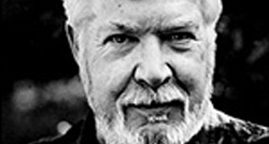It starts with tears and ends with a twinkle in the eye of William Whitehead.
In Good Grief, an essay filled with humour and grace, Whitehead shares how he coped with the loss of Timothy “Tiff” Findley, his partner of 40 years: he laughed and he cried. At first, mostly the latter.
“I made no attempt to suppress my grief,” writes Whitehead. “And even had I wanted to put a damper on it, I would have failed. It was too deep—too insistent. In France—back home in Stratford—even recently—I punctured my days with bouts of uncontrollable sobbing.”
The essay appears in a new collection called The Heart Does Break: Canadian Writers on Grief and Mourning. The book includes pieces by fellow queers Marni Jackson and Erín Moure (both writing about parents) and an essay on queer avante poet bpNichol by colleague and friend Frank Davey.
And as for Bill, half of one of the most famous gay couples in Canadian arts and letters? How’s he doing now?
“I will never cease to be achingly aware of his absence, and there will always be a measure of grieving in my life. In my life. That’s important. I’m still alive,” he writes.

Skeptical of religion, Whitehead instead focuses on remembering Tiff as he was — gregarious, sweet and a little goofy. He chooses quirky anecdotes from their shared past, and he retells the well-worn story of how they met. It’s an important part of the process of coping.
“I love to relive some of our times together. I love imagining how he would react to what has happened since he died,” he writes.
Rounding out the portrait of grief, Whitehead talks how he has found happiness in the wake of loss. He mentions a couple of the men in his life since Tiff, including a relationship with Trevor Greene, a BC man in his early 20s.
“He is extraordinarily lively, bright, and well-read. He is good company and he is kind,” Whitehead writes in the closing pages. “And he had dedicated himself to seeing me all the way to death.”
It’s good to hear.
*
The Heart Does Break.
Edited by George Bowering and Jean Baird.
Random House, $30.

 Why you can trust Xtra
Why you can trust Xtra


